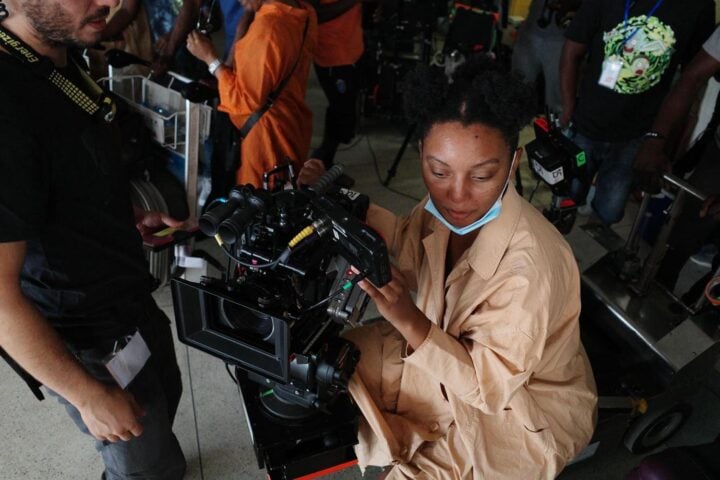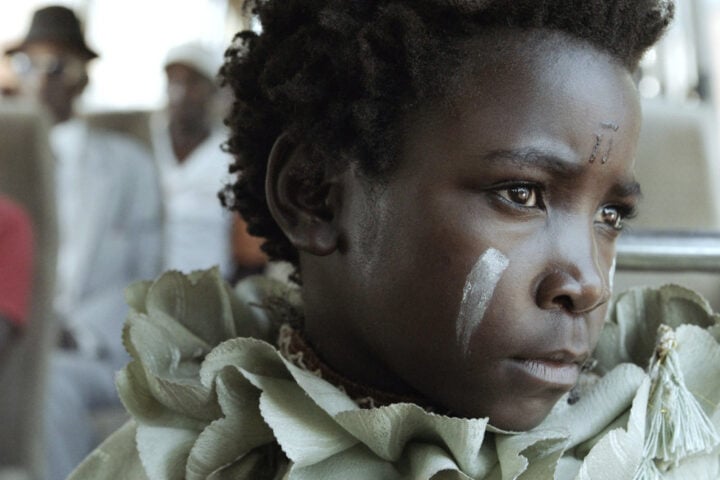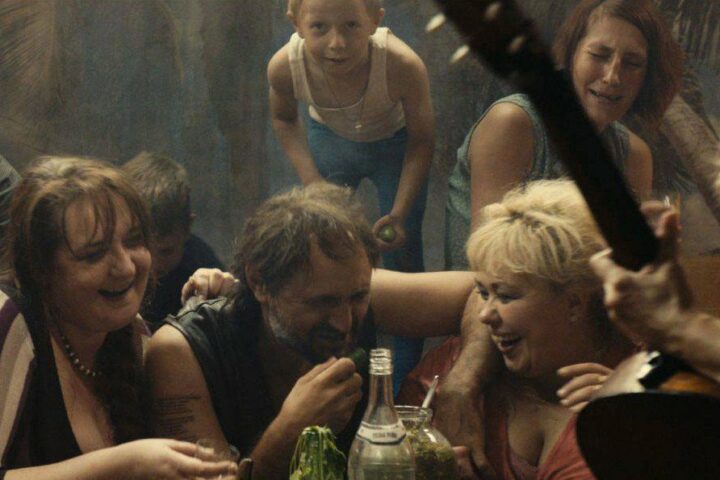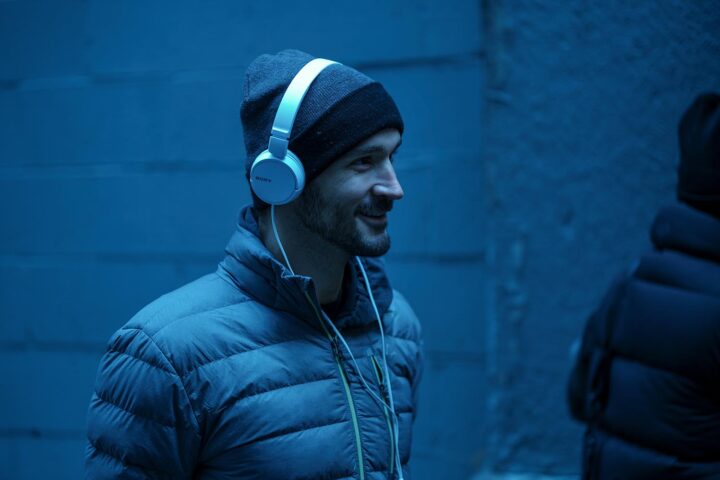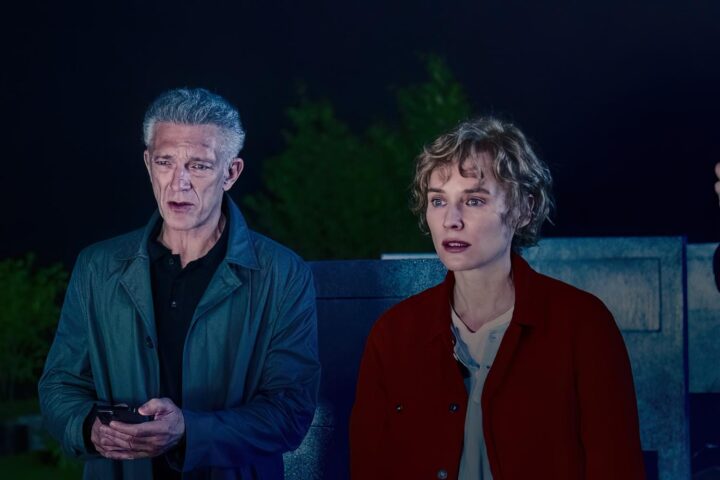Writer-director Rungano Nyoni’s On Becoming a Guinea Fowl begins magnetically and absurdly, and with a wonderfully welcome lack of forewarning of what’s to come. Dressed like Missy Elliott in her iconic music video for “The Rain,” Shula (Susan Chardy) is heading back from a “fancy dress” party when her pop music-infused reverie is interrupted by the sight of her Uncle Fred (Roy Chisha) lying dead on the side of the road.
What follows is a sardonically funny phone call between Shula, strangely unbothered in her extravagant gemstone-adorned helmet and inflated black romper, and her father (Henry B.J. Phiri) as she tells him that her uncle is a corpse. But Dad has a hard time understanding her and insists that Uncle Fred cannot die, and that she must be wrong. The next day, one of her many aunts demands that she feign ignorance if the cops ask her what she knows. Why Uncle Fred is lying dead just down the street from a known brothel, his body showing no evidence of physical trauma, is a mystery that’s kept under wraps for the duration of the film.
Like Nyoni’s feature debut, 2017’s I Am Not a Witch, On Becoming a Guinea Fowl is interested in the defiance of entrenched patriarchal custom and the ways in which her native Zambia’s more traditional values clash with modern secular and commercial ones. Here, a prodigal daughter’s return home is immediately disrupted by a tight-knit community desperate to bury anything that might upset the apple cart. As Shula navigates her family’s unsettling dynamics, she must contend with attempts at being gaslit into silence—about her own experiences, and about those of her cousins, Nsansa (Elizabeth Chisela) and Bupe (Esther Singini).
Throughout the film, Nyoni seeks to put us in a kind of limbo space alongside her protagonist, who’s beholden to the uncomfortably rigid rules of mourning. Shula is, at first, content to move on from Uncle Fred’s life but is soon scolded for her apparent lack of sadness; displaying one’s extreme grief is considered appropriate. Bizarrely, the family is meant to indulge in said grief despite the continued cone of silence around Fred’s demise. Being pulled back to the funeral house, Shula learns that her uncle may have been sexually abusive toward her cousins, a possibility that forces her to grapple with her suppressed trauma.
Nyoni’s critique of her native country’s gender-based discrimination is as acerbic as it is unforgiving. As more and more neighbors and extended family performatively insert themselves into the mourning process—and in a way that comically suggests that they’re just taking advantage of the free food offered at mourning rituals—the living get ignored. Bupe’s videotaped confession of having been harassed by Uncle Fred is kept under wraps, and she isn’t given the attention she needs as a mysterious chronic illness ravages her body. Fred’s young widow, who’s borne seven children, is lambasted by community leaders who see her husband’s alcoholism and subsequent death as a direct consequence of her “failure” to keep him happy. In more comic ways, Shula is punished for bathing, an apparent no-no for a direct mourner.
The film’s deft handling of tone recalls Djibril Diop Mambéty’s fairy tale-like Hyenas. In one moment, Shula opens the front door of the house to find three women crawling around on the ground and groaning in distress, and a journey to find Nsansa plays out across a curiously flooded housing unit. The aggressiveness with which the many aunties of the family deal with each other from across families becomes an absurd game of escalating barbs. Nyoni often cheekily frames her shots as unexpected visual jokes, like the billboard next to Fred’s body that promises miracle cures. Many of these images are thrust upon us without context, their mysteriousness suggesting a society that’s ancient, sometimes dangerous, and frequently silly.
On Becoming a Guinea Fowl sustains a thread of dry humor until the final act, when it provides crucial information about all of the characters that recontextualizes everything we’ve learned about them up to this point. Suddenly, the film blazingly transforms into a quiet tragedy of unimaginable scope. And through it all, Nyoni continues to humorously underscore the backwards nature of a community’s ideas of justice. In a place where local services only have one car, and a reported dead body can’t be picked up until the following day, community law enforcement takes its place, making impetuous judgments and with cruel finality.
In keeping with the film’s modus operandi of flipping humor on its head, Shula and Nsansa imitate the cawing of the guinea fowl one night in an attempt to cheer up Bupe at the hospital, just before the film tells us more about the animal’s behavior. A small bird that asserts itself through a high pitch that’s meant to warn others when a predator is nearby, the guinea fowl is something of an obvious allegory, but On Becoming a Guinea Fowl is, more deeply, about the process in which people are often thrust into roles of reluctant heroism and solidarity.
Since 2001, we've brought you uncompromising, candid takes on the world of film, music, television, video games, theater, and more. Independently owned and operated publications like Slant have been hit hard in recent years, but we’re committed to keeping our content free and accessible—meaning no paywalls or fees.
If you like what we do, please consider subscribing to our Patreon or making a donation.


